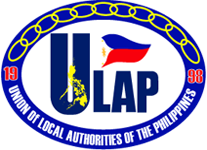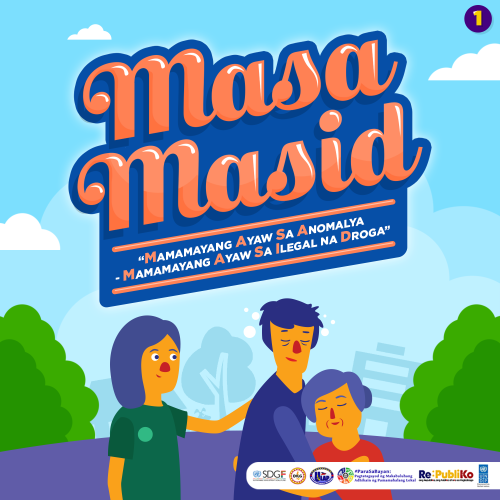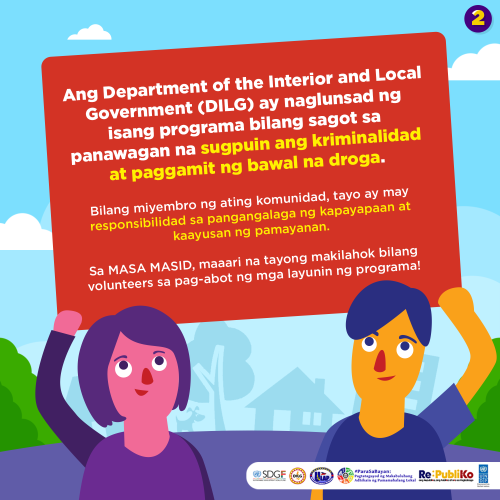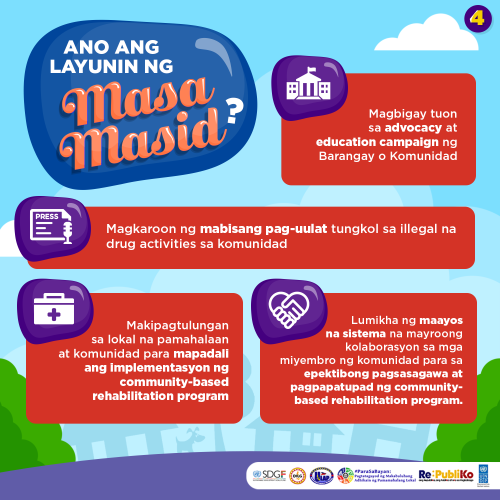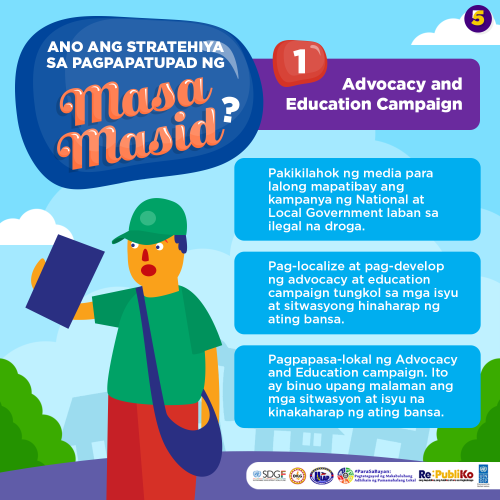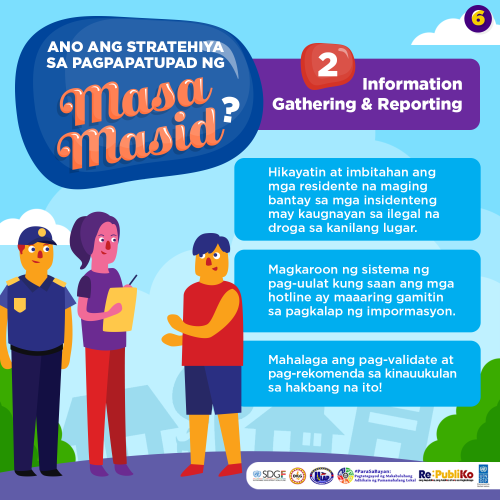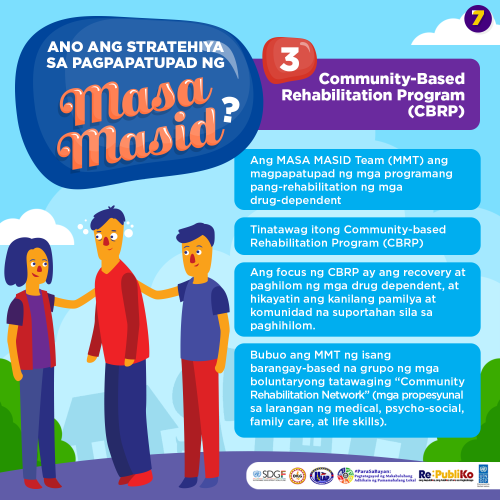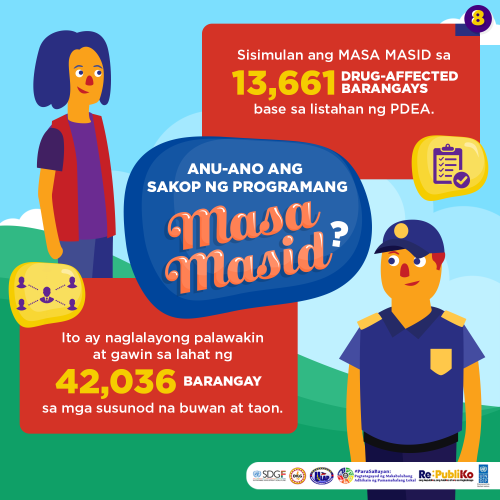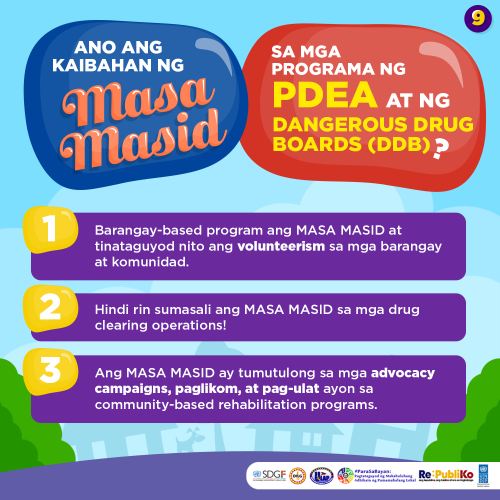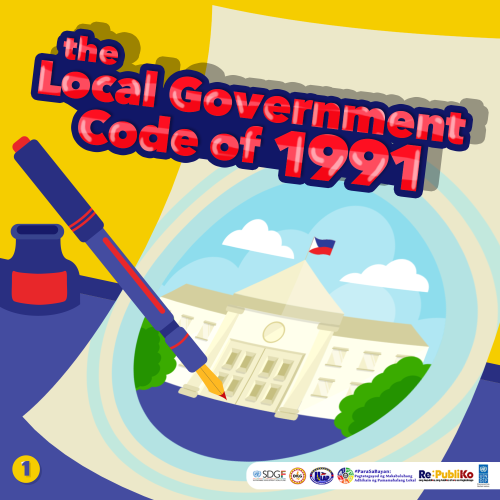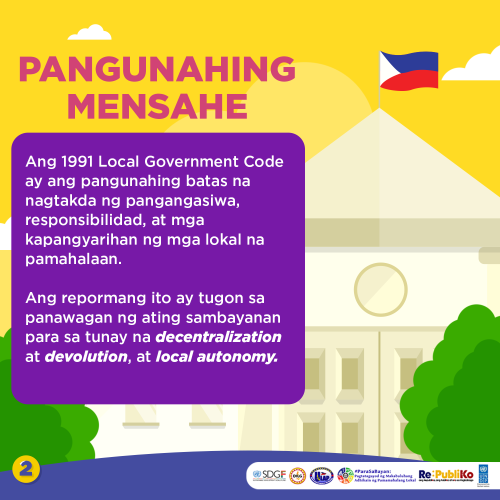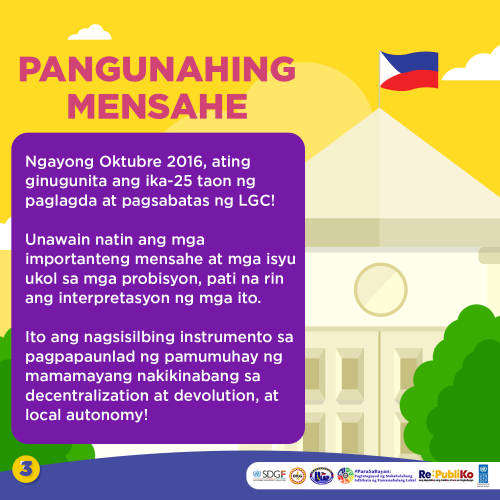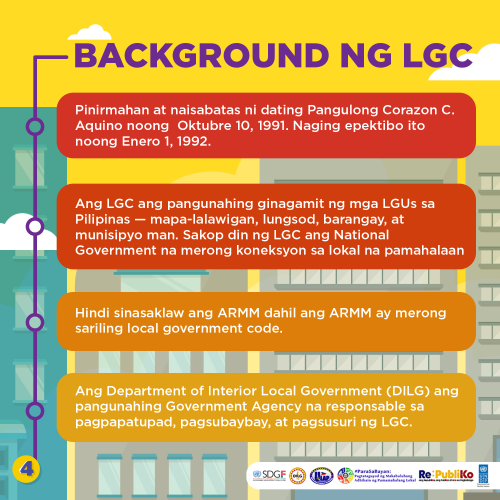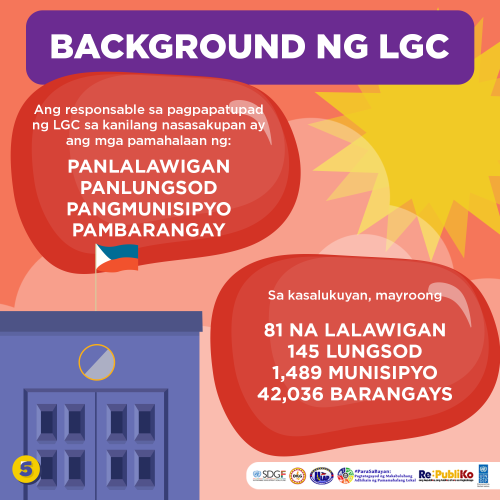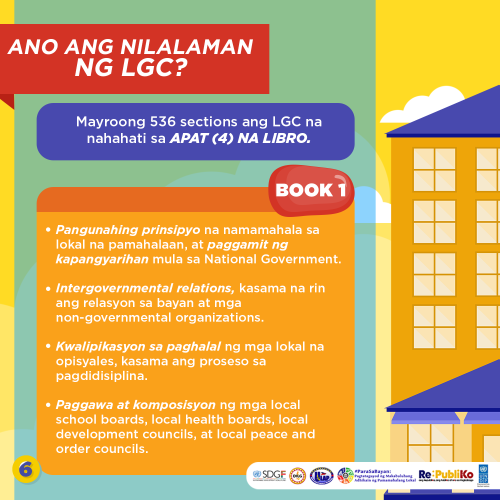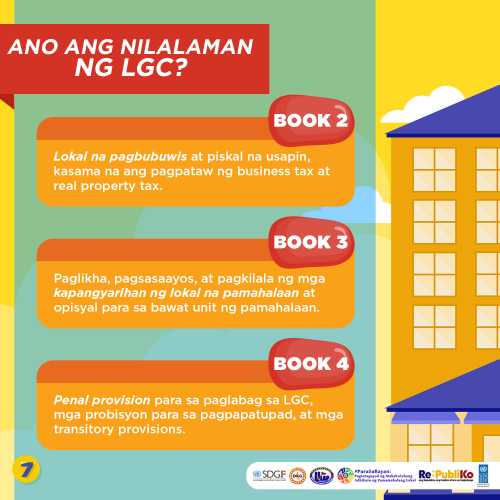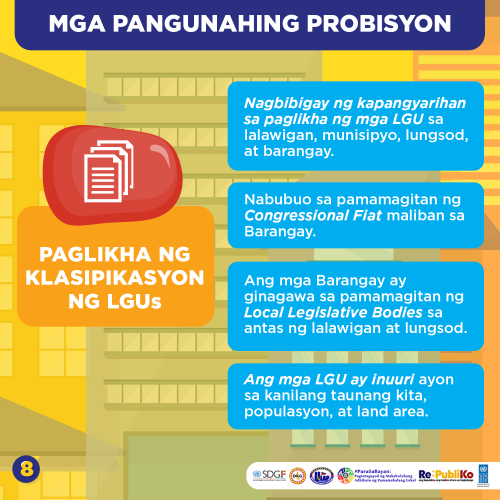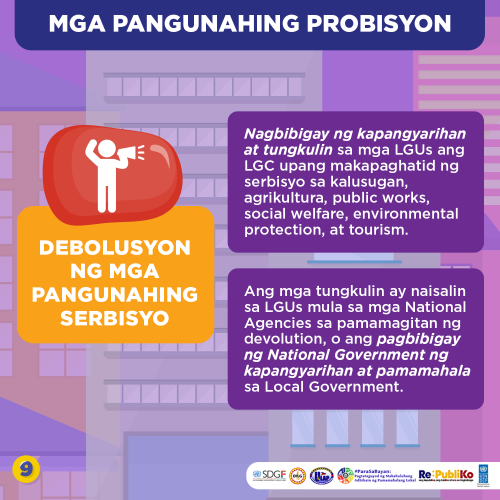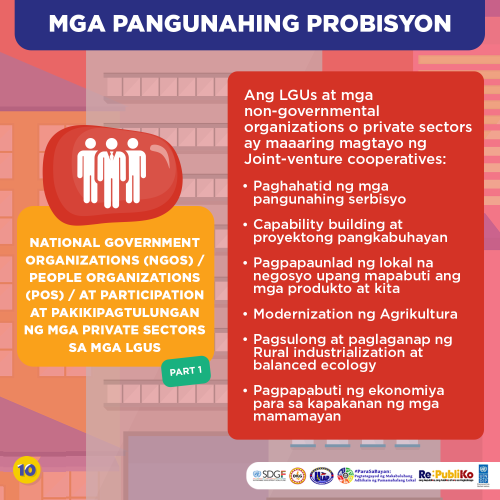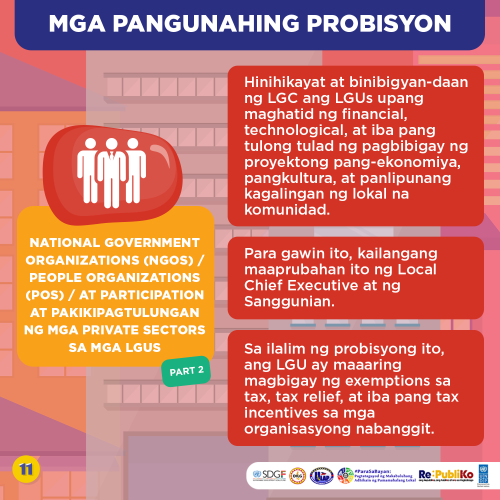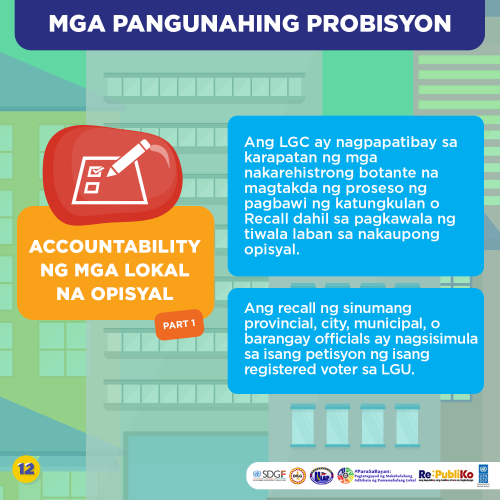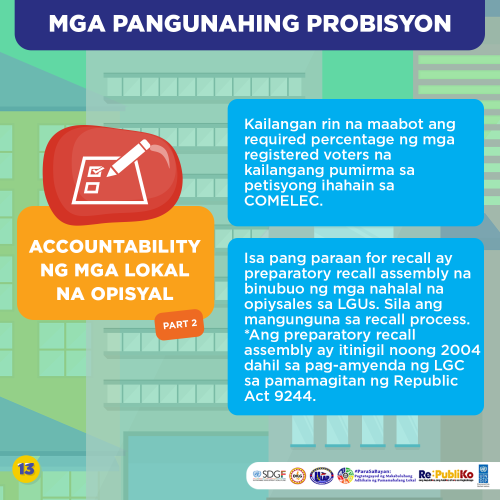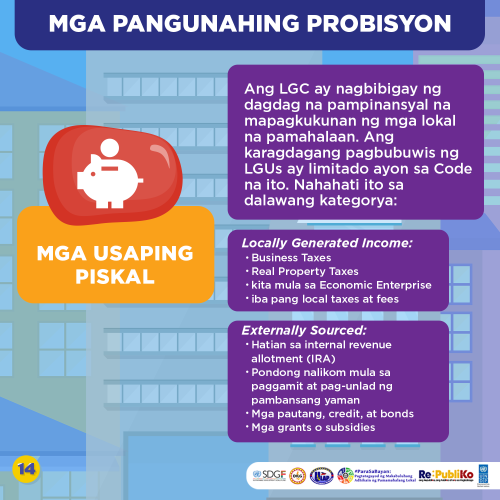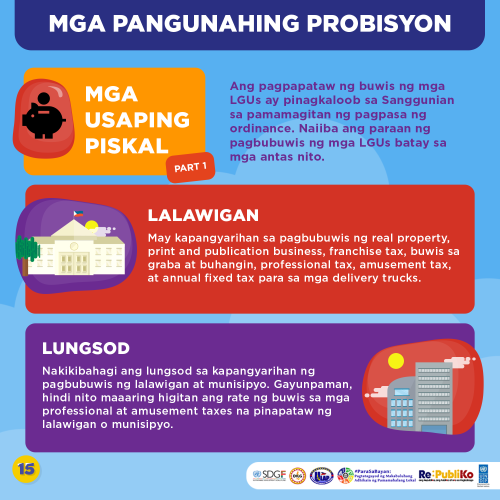MASA MASID: Paano makilahok sa programang ito ng DILG?

MASA MASID: Paano makilahok sa programang ito ng DILG?
Kamakailan, inilunsad ng DILG ang MASA MASID (Mamamayang Ayaw Sa Anomalya; Mamamayang Ayaw Sa Ilegal na Droga). Sa programang ito, nagbubukas ng roles bilang volunteers upang makiisa sa Ugnayan ng Barangay at Simbahan (UBAS), mga Barangay LGUs, CSOs, POs, at NGOs. Ilan sa mga layunin ng programa ang magkaroon ng advocacy at education campaigns tungkol sa illegal drugs, at magkaroon ng effective na community-based rehabilitation programs sa mga lokalidad.
Tingnan sa infographics na ito kung paano ka maaring makiisa sa MASA MASID.
Ang infographics na ito ay handog ng partnership ng DILG, Union of Local Authorities of the Philippines (ULAP), at United Nations RePubliKo campaign.
Local Governance Congress 2016
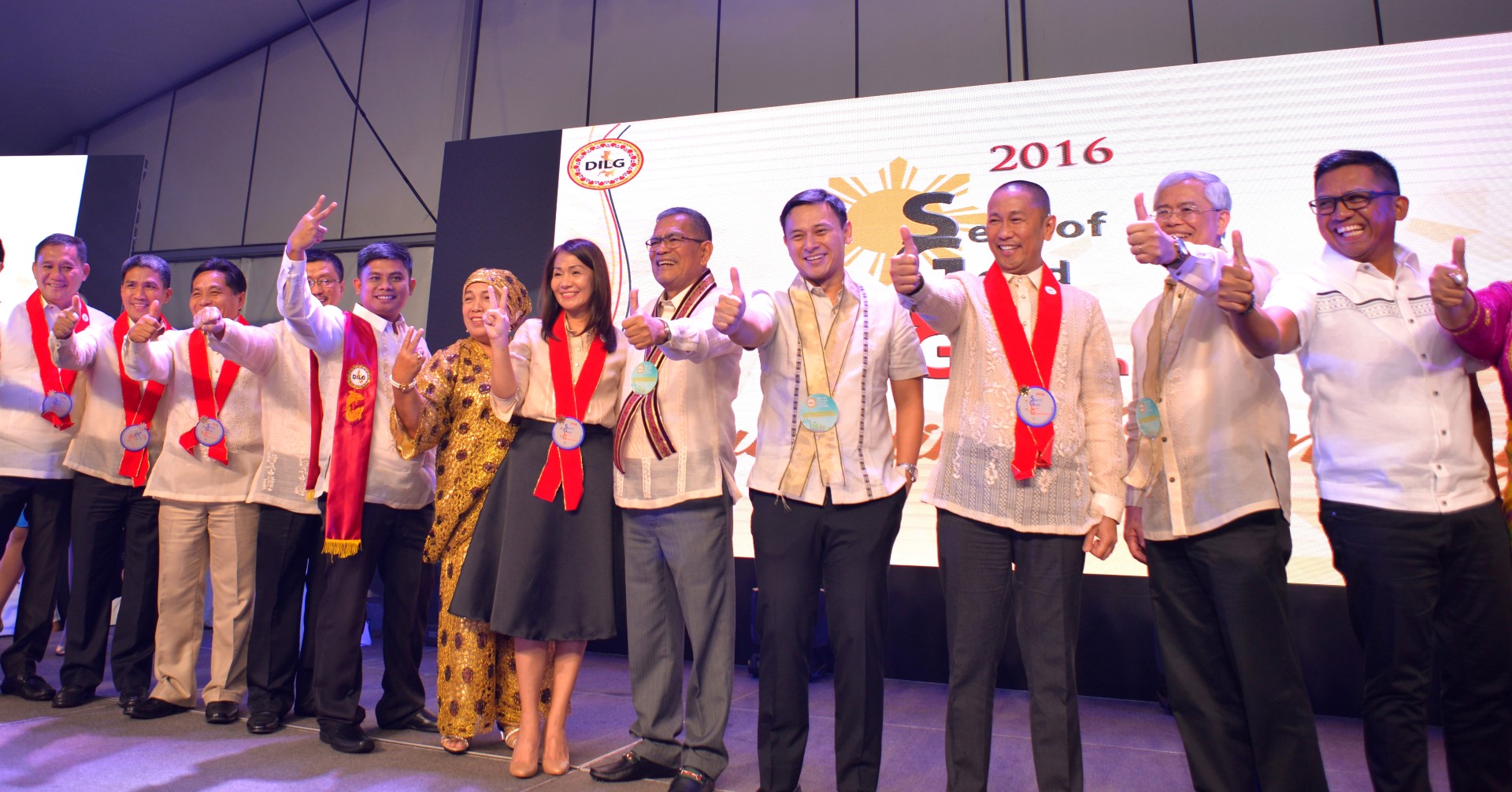
The Department of the Interior and Local Government, in partnership with the Union of Local Authorities of the Philippines, organized the 2016 Local Governance Congress as part of the series of activities in celebration of the 25th Anniversary of the Local Government Code (LGC) of 1991. This was held on October 27, 2016 at the Sofitel Philippine Plaza Hotel, attended by thousands of local government officials, National Government representatives, civil society organizations, and other development partners.
Carrying the theme “Pagsulong, Progreso, at Pagbabago”, the celebration aimed to deepen understanding and appreciation of the gains from the 25 years of implementing the Local Government Code, with keen interest on prospects for the future of local governance in the Philippines. The celebration delved on the gains and innovations significant breakthroughs and exemplary performance of the LGUs and all the partners and champions on local governance. The activities geared towards realizing a genuine and meaningful local autonomy and enabling local governments to attain their fullest development as self-reliant communities and more effective partners in the attainment of national goals.
The one-day event was comprised of five concurring events highlighted by a celebratory program in the afternoon of the 27th. The program recognized the Principal Authors of the LGC, former Senator Pimentel and Rep. Hilario de Pedro, who were represented by their families, Mrs. Lourdes Pimentel, and Aurora, Hilario and Hillary de Pedro, respectively. The conferment was headed by Secretary of the Interior and Local Government Ismael Sueno together with then ULAP President Gov. Alfonso Umali, Jr. and current League of Provinces of the Philippines (LPP) President Gov. Ryan Singson, and Keynote Speaker Sen. Loren Legarda.
The program also served as an opportunity to launch the Local Government Agenda, the LGU roadmap to genuine local autonomy in response to the call for transition to a Federalist form of government. This roadmap was developed as a working draft by ULAP to set a strategic direction for LGUs in their journey to fulfill the thrusts of the Code in the coming years. Consequently, the program included a commitment signing that symbolized collaboration among the local governments, executive and legislative branches, civil society, and private sectors for local development.
This was followed by an awarding ceremony for the Lupong Tagapamayapa Incentives Awards (LTIA) and Seal of Good Local Governance (SGLG). 12 outstanding Lupong Tagapamayapa for 2015 were awarded for their remarkable practices as indigenous conflict resolution mechanism in the barangays. Moreover, 306 provinces, cities and municipalities were conferred with the 2016 Seal of Good Local Governance for their notable performance in the delivery of local services.
Local Government Code of 1991: Ano Ito?

ULAP consults Palawan Stakeholders on Possible Creation of a Local Multi-Stakeholder Group on Extractive Industries
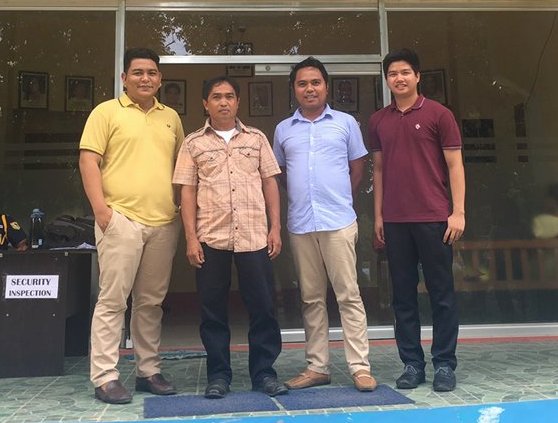

On October 18-19, 2016, the Union of LocalAuthorities of the Philippines (ULAP) project team headed by Director for Plans, Programs and Policy Mr. Genixon David met with various Palawan stakeholders for the Increasing Transparency in Extractive Industries in the Sub-National Level Project. The team, together with provincial government representative, Mr. Glenn Vallejos met with Hon. Jose C. Alvarez, Governor of the Province of Palawan, Mr. Artolin Edlap, the IP Representative to the Sanggunian Municipality of Bataraza and Ms.Jocelyn Mabuyao, President of Kalipunan ng Liping Pilipina Palawan Chapter. The meeting-consultation focused on giving an overview of the project, thus getting buy-in from the aforementioned stakeholders. More so, the ULAP project team looked into the local experiences, context, stories and concerns of various stakeholders affected by the Extractive Industries. The shares from the extractive industries (EI) are important to local governments as these shares are utilized to finance local development and livelihood projects for their constituents.
The project, which won during the Global Innovation Competition and is funded by Making All Voices Count (MAVC) and Hivos International, is considered to be the first in the Philippines to use an innovation approach in conducting extractive industry transparency initiatives at the local level and to provide an avenue for localized decision-making and agenda-setting of the project sites. The project aims to (a) bring together all of the stakeholders through the creation of the Multi-Stakeholder Group for a collaborative effort to spearhead the innovation and yield context-based information on the industry and the issues at the local level, (b) facilitate info-mediation both in the national and local levels through the innovative technology-based platforms, and (c) enhance citizen engagement and participation in agenda-setting and policy-making and in translating local government shares from EI to projects and programs that will address the communities’ perceived needs.
The meeting-consultation paved the way for local EI stakeholders to understand, appreciate and commit to the project objectives. Next activities for the project include Capacity Development Trainings and Design Thinking Workshop on January and February 2017, respectively.
ULAP consults Local Colleges and Universities on the Senior High School Voucher System
 The Union of Local Authorities of the Philippines (ULAP), under a grant from the Coalitions for Change (CfC) supported through the Australian Embassy – The Asia Foundation (TAF) Partnership in the Philippines, conducted a focal group discussion (FGD) with Local Colleges and Universities (LCUs) on the supply and demand of senior high school vouchers system particularly on Non-DepEd Schools, on August 8, 2016 at the ULAP Office in Mandaluyong City.
The Union of Local Authorities of the Philippines (ULAP), under a grant from the Coalitions for Change (CfC) supported through the Australian Embassy – The Asia Foundation (TAF) Partnership in the Philippines, conducted a focal group discussion (FGD) with Local Colleges and Universities (LCUs) on the supply and demand of senior high school vouchers system particularly on Non-DepEd Schools, on August 8, 2016 at the ULAP Office in Mandaluyong City.
During the discussion, different issues and concerns emerged on the implementation of Senior High School (SHS) Voucher System in their respective schools. One frequently raised issue was on the use of online school applications and services in relation to voucher application. In addition, other technical issues such as incomplete data base, off-line systems and multiple registration of voucher applicants were also highlighted. The participants also painted a clear picture of how their respective local government agencies provide additional resources and support in the implementation of DepEd’s SHS program.
The consultation ended with recommendations and suggestions on how to address the issues and concerns identified above. It generated and consolidated policy directions in preparation for the Round Table Discussion (RTD), which will be held on the last week of August, 2016 with concerned national government agencies and local government units, that aims to advocate for the development of sound policies on SHS Voucher System.
The LCU representatives expressed that the discussion provided an avenue for them to share their stories and insights and at the same time listen and learn from other LCUs as well. Among the participants who attended were representatives from the University of Makati, Pamantasan ng Lungsod ng Maynila, Pateros Technological College, Quezon City Polytechnic University and the City College of Tagaytay.
ULAP MODERATED PANEL DISCUSSIONS OF THE PH-EITI LGU ROADSHOWS
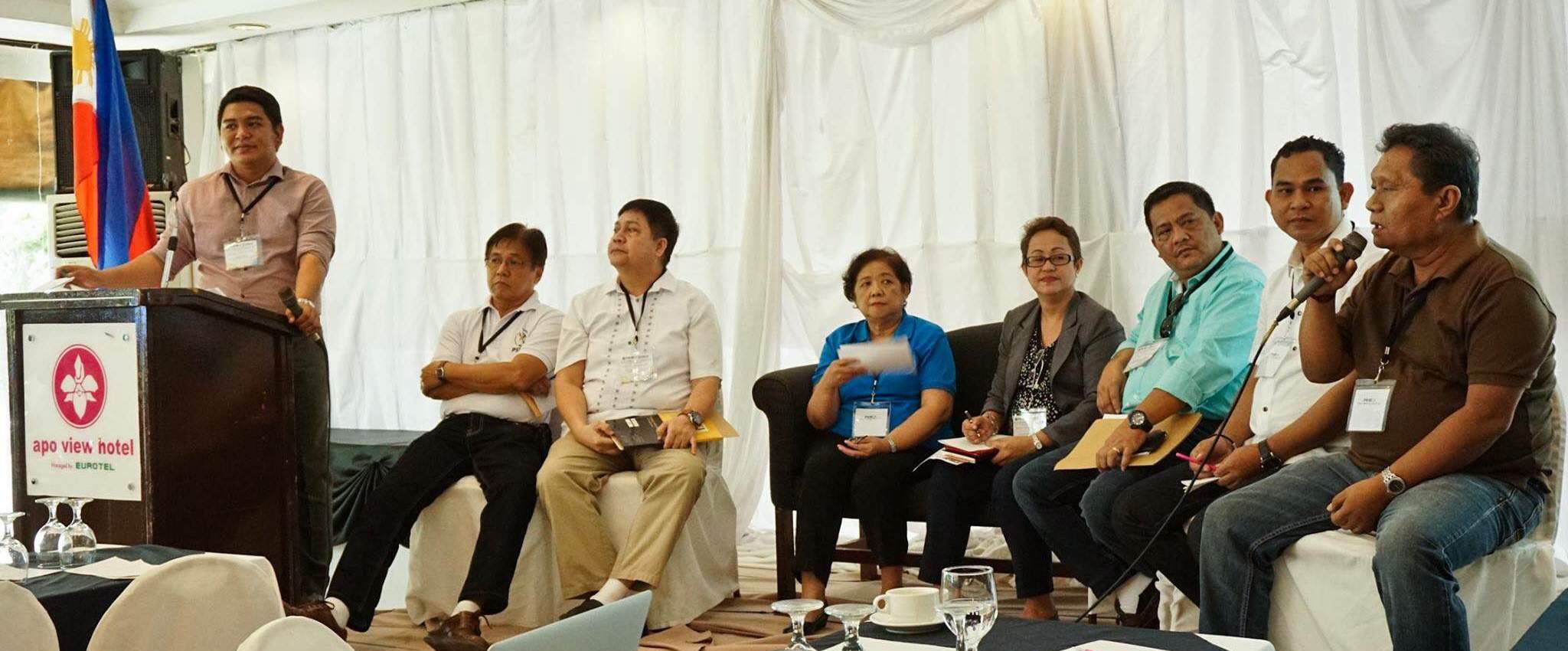
The Extractive Industries Transparency Initiative (EITI) is a global standard of transparency that aims to encourage countries to be more transparent in reporting the benefits they receive from their country’s natural resources. Following its implementation in the country in 2012, it has been widely seen as an effective platform for sustained dialogue and tripartite collaboration among government, civil society and the extractive industry. Part of this initiative is a series of annual LGU roadshows, offering venue for local stakeholders to discuss the results of the Philippine EITI (PH-EITI) reports, formulate policy proposals based on its findings and keep track of government’s progress in implementing reforms. The Union of Local Authorities of the Philippines (ULAP), as a member of both PH-EITI Multi-stakeholder and Technical Working Groups, facilitated the multi-stakeholder panel sessions of its 2016 series, The roadshows ran from August to September to cover all regional EI hosts in the country.
This series of 2-day forum showcased the 2nd PH-EITI Country Report and facilitated dialogues among stakeholders on extractive industries (EI). As an integral part of the forum, the panel discussion likewise surfaced issues and concerns on EI in terms of revenues, environmental impact, corporate responsbilities, among others. The sessions were moderated by ULAP Director of Plans, Programs and Policy, Mr. Genixon David and participated by representatives from national and local governments, civil society, indigenous people communities, and private sector.
The roadshows also facilitated presentations and discussions focused on: (1) Share from National Wealth of the LGUs; (2) Social Development and Management Program and Local Development Plan; (3) Environmental Governance and Monitoring Process and Multipartite Monitoring Teams and LGUs; (4) Royalties of the Indigenous Peoples; and (5) Environment and Natural Resources Data Management Tool (ENRDMT). These were followed by breakout workshops that fowarded the agenda, “Governance in the Extractive Industries, and Collection and Management of Revenues from the Extractives in the Local Level”. Day 2 of the forum was primarily devoted for a workshop on ENRDMT for all the participating local government treasurers and accountants.
The first leg of the Roadshow was conducted last August 10, 2016 at Apo View Hotel, Davao City while the suceeding legs were held on August 24-25, 2016 at Quest Hotel, Cebu City; August 30-31, 2016 at City Lights Hotel, Baguio City; and September 14-15, 2016 at A&A Plaza Hotel, Puerto Princesa City, respectively. These were participated by officials from LGUs hosting EI companies and operations in the localities as well as civil society and indigenous peoples groups. Ultimately, the Roadshows left a positive mark committing that the PH-EITI efforts will continue to further promote the improvement of the extractive industries situation in our country.

